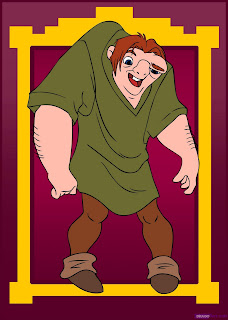The letter from the hospital, for example, stated that my son had an appointment with the "Spinal Deformity Team".
Deformity. What a word!
de·for·mi·ty
1. The state of being deformed.
2. A bodily malformation, distortion, or disfigurement.
3. A deformed person or thing.
4. Gross ugliness or distortion.
5. (Medicine / Pathology) Pathol an acquired or congenital distortion of an organ or part
6. (Psychology) a defect, esp of the mind or morals; depravity
I can see why they say that - it distinguishes his case from Spinal Surgery or Vertebral Trauma - but it's quite stark.
It also has such negative connotations in many walks of life. The definitions above point to "ugliness" and "depravity". It conjures up images of Hunchback of Notre Dame (now if only they'd had casting in his day!!) and we all know that he was actually a real sweetie once you got to know him (well, according to Disney anyway!).
I used to work at an organisation called L'Arche with people who had special needs - some of whom couldn't walk, talk or eat by themselves and needed 24/7 care whereas others were fairly independent. There are 137 L'Arche communities in over 40 countries worldwide and as well as day-to-day personal care within the house where I lived, I was involved in translating and interpreting (I speak French, German and Spanish), for example at their international meetings, and so was acutely aware of the question of language.
The terminology has changed a huge amount over the years and is different in different countries (even among the English-speaking ones) which means you might use the "wrong" phrase even if you have the best of intentions.
I noticed recently that on the L'Arche UK website they now say "people with learning disabilities" whereas on the L'Arche International website they use "people with intellectual disabilities" or "people with a developmental disability". When L'Arche was first founded by Jean Vanier in the 1960's they still used terms such as "retarded" and later on "mental handicap". All such powerful and emotive terms.
The key to it all is, I think, respect for the person we are referring to. It's important to keep in mind they are a person not a condition (not using "the disabled" for example).
Of course, many of the medical terms are written in Greek or Latin which obscures their meaning for most of us - yet often the terms are extremely literal. The derivation of orthopaedics and scoliosis is a case in point:
Orthopaedics
According to Wikipedia, "Nicholas Andry coined the word "orthopaedics", derived from Greek words for orthos ("correct", "straight") and paideion ("child"), when he published Orthopaedia: or the Art of Correcting and Preventing Deformities in Children in 1741. Correction of spinal and bony deformities became the cornerstone of orthopaedic practice."
Scoliosis
Scoliosis is derived from the Greek word skolios meaning "crooked" - a very literal description of the curved or S-shaped spine it refers to in medicine!
On reflection, I don't really object to the use of the term 'spinal deformity' as it describes my son's condition. But I think those in the medical profession need the occasional (well-phrased!) reminder to prevent them becoming immune to how powerful such language can be!

Another word I rather like is "idiopathic" from the Greek "idios - one's own" and "pathos - suffering". So a case of infantile idiopathic scoliosis means a small child with a crooked back and we don't know why.
ReplyDeleteI think a lot of medical language (will be interesting to hear how much of a barrier this is at your Oxford conference) is designed to create an us (clever, intelligent medical professional) and a them (ignorant, dependent patient). And, despite the progress of medical science, to disguise our still profound ignorance of so much of how our bodies work.
I think language is helpful if it describes what is, unhelpful if it makes judgements, actual or implied. But part of the problem is that we keep on insisting on making judgements - good or bad, right or wrong - about facts. Which is why the PC world has to keep moving its definitions. Mental handicap, retarded, developmental disability, intellectual disability only carry their emotive power because of our judgements about the person they label.
I don't see J as in any way deformed. Just the way he is formed has some implications which may require intervention or treatment. How about the Spinal Correction or Spinal Intervention team?